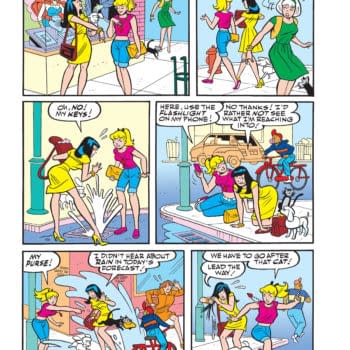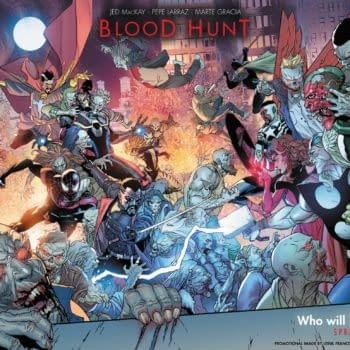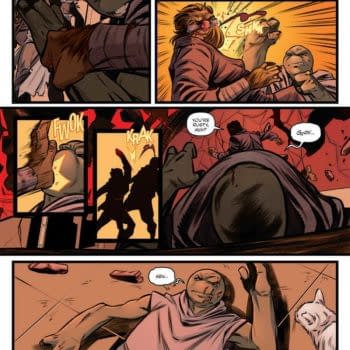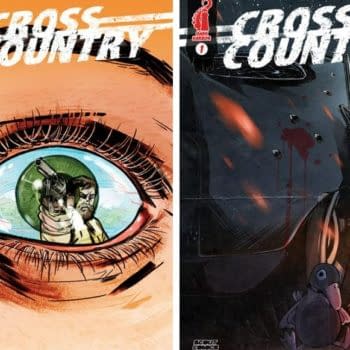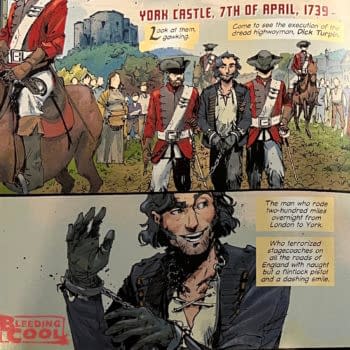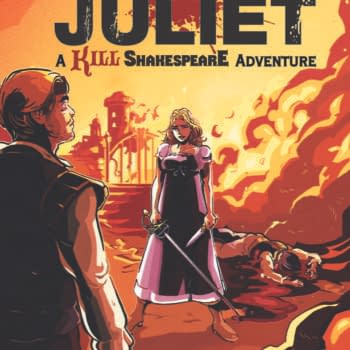Posted in: Comics | Tagged: arrow, Comics, entertainment, marc guggenheim, micronauts, Swords of the Sawshbucklers
Marc Guggenheim On The Influence Of Bill Mantlo
Marc Guggenheim has his hands in both of the big comic book universes. On the comic side he is currently writing X-Men: Gold for Marvel, while on the DC side he is one of the driving forces behind the Arroverse series on the CW and co-showrunner on Arrow. Turns out that he is also a huge fan of the Bill Mantlo / Jackson Guice series Swords of the Swashbucklers series that is being collected by Dynamite through a kickstarter project. With Mantlo's work receiving fresh attention between Rocket Raccoon, Cloak & Dagger and this new collection, I've reached out to Marc to talk to him about the effect Mantlo's work had on him.

MARC GUGGENHEIM: I THINK my first exposure to Bill's writing was Micronauts #3. I was nine years old and obsessed with the toys which, to my young mind, the comic bore little resemblance to. But I didn't care. I really responded to the writing. (I'm ashamed to say that I was too young to appreciate Michael Golden's art at the time.) That said, it's more than possible that I'd read Bill's work before — probably one of his Spider-Man's — and didn't know it.
DW: As a creator, did Bill's work have any influence on you? Which series or storyline had the biggest impact on you and your work?
MG: I'm sure he's had a huge impact on my writing. I was a devoted reader of Rom, Micronauts, Cloak & Dagger, Rocket Raccoon, Incredible Hulk, Alpha Flight and Swords of the Swashbucklers. I can't imagine my voice as a writer and my sense of story wasn't impact by such a deep dive into his work. Probably my biggest takeaway was that I could tell — even from a young age — that Bill wasn't precious about the characters he was writing. He wasn't afraid to really change-up the status quo. Characters died. Characters changed. You could pick up any of his books and the characters and circumstances would be completely different from where they had been a year before. I'll always have a soft spot in my heart for the storyline that built up to Incredible Hulk #300, where Bruce Banner finally gained control over the Hulk only to tragically lose it completely to the point where the Hulk became a mindless beast.
All of that said, it's Bill's experience as an attorney — he was a public defender — that had the biggest impact on me insofar as the fact he was both a lawyer and a comic book writer gave me incredible inspiration because that's what I wanted to do with my life and it was extremely motivating to see that such a strange combination of careers had been done before.
DW: What is it about Bill's work that made it different and unique among the books being produced at the time? What do you think was his greatest strength as a writer?
MG: Well, like I said, Bill's willingness to evolve his characters and the books' status quos really made an impact on me and it was something that was — and remains — very unique. Chris Claremont is known for his long-tail subplots during his original seminal run on X-Men, but it felt to me like Bill accelerated the soap opera elements of his stories so that the changes and evolutions happened at a much faster pace. I'd also be remiss if I didn't call out the enormity of the challenge Bill had in adapting Micronauts and Rom. He didn't have a lot to work with. These toys didn't offer a deep mythology to build from. In fact, they hardly offered any backstory. Bill had to create all of that out of whole cloth while still getting to the essence of these concepts. It's extremely hard to do, as evidenced by the lack of similarly successful toy adaptions in comics.
DW: Since his tragic accident was over twenty-five years ago, a good number of today's comic readers may have never read his work or only know him through his creations like Rocket Raccoon or Cloak & Dagger. What series or story would you suggest would best showcase Bill's talent and why?
MG: There are SO MANY to pick from. For sentimental reasons, I suppose I'd have to choose the final issue of Micronauts. There's a sense that it was rushed — everything wraps up in 22 pages — but it's also a beautifully poignant comic that showcases the beauty of Bill's writing.

MG: Like Bill's, any of our lives can change in an eyeblink and while it's not practical to live with that anxiety hanging over us every day, it is extremely important to occasionally remind ourselves of what we stand to lose and how thankful we should be for our lives.
DW: Being a comic creator is living life without a safety net. There are groups like the Hero Initiative, or the folks behind the Swords of the Swashbucklers kickstarter, that are trying to help creators like Bill. But is there more that can be done to help the people who created so many of the characters we still enjoy today?
MG: Yes. First and foremost, we need to resist the passage of the American Health Care Act of 2017 (AHCA). This bill, which is headed to the Senate as I write this, would, as currently written, take away health care from millions of Americans. This includes many comic creators who receive their health insurance through what's colloquial known as "Obamacare" which the AHCA is trying to "repeal." If you don't believe me, check out the Twitter feeds of the writers and artists who have been tweeting about their fears of losing their health care ever since the AHCA passed the House of Representatives. I recognize that this may sound political, that I might even be violating that unspoken rule of etiquette not to discuss politics in a forum such as this, but health care isn't a political issue. Rather, it's a human issue that has been politicized. But, believe me, to the millions of Americans — some of whom produce your favorite comics — it's not about politics. It's about living. It's about remaining healthy. It's about getting treatment that they need. And it's about doing all of these things — these fundamental, basic, human things — without the fear of going bankrupt.









